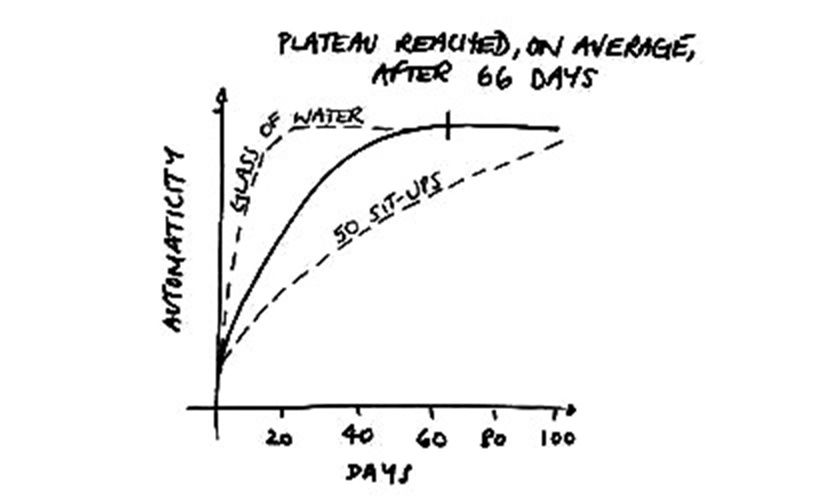**-day habit
"21 days to develop a habit," this sentence I believe many people have heard about, and I believe most of this theory in the subconscious. But this sentence is Who raised it? This is an irrefutable theory it? This theory has not been subjected to the test of practice.
21 days into the habit of author
According to legend network: American named Maxwell Maltz cosmetic surgery doctors found amputees average it takes 21 days to get used to losing a limb. So he said, people need an average of 21 days to major changes in his habits of life. This theory Dinggong gradually sinking under the passage of time, become "21 days to develop a habit" . For one person, a habit is different compared to the psychological pressure on people to accept a caused by the same irreversible fact. Su was the sigh , "I have two ares Tian Luoyang, could I wear the six countries of India" , people are forced out, but human nature is lazy and seek comfort is our common humanity.

Why agree with this theory in the subconscious
The current plethora of social training institutions, through publicity and training institutions, the media, "Brick House" and other such channels, three into a tiger, this theory is basically visible in the "habit world" everywhere. In this society, there are many such voice: "Multi learn some skills to give yourself extra points" , so in order to quickly learn some skills, people become home to impetuous. However, bringing in the subsequent training institutions are fast-food-style training. Faced with these fast-food training, coupled with awareness training institutions and a number of "success stories of ordinary people", even skeptical will believe, after all, no one will admit worse than others. Successfully entered the trap training institutions.
Theoretical analysis "21 days to develop a habit."
The theory of three essential elements: people, 21 days, habits. Hypothesis established that in 21 days, whether anyone can develop a specific habit. According to the actual, which is do not fly. For the same person, the difficulty to develop different habits are different. For example, before going to bed every record weather today than write 800 words a day before going to sleep diary should be simple, perhaps only ten days the former and the latter take months. The above is only theoretical, but also reasonable in the circumstances.
Marxist View of Practice that: practice is the source of knowledge and understanding of the development of the fundamental driving force, is the sole criterion of understanding is correct or not. Practice and understanding of the relationship of dialectical unity, the practice of decision awareness, awareness of the practice has a huge reaction. Below is carried out by the UK Health Behaviour Research Centre experimental analysis. In this experiment, the researchers examined different diet, many participants showed a relationship with the exercise habit forming a curve (solid line) below:

Has raised an average of the maximum inertia habits need 66 days. Although the average of 66 days, but with a different diet big time gap is formed, as shown in Figure 20 to 100 days. A glass of water every day is easy, about 20 days to form a lasting good habits. However, do 50 sit-ups a day it takes about 100 days.
According to China's Success brick home for a long time prone study ( 21 days effect ), habit forming roughly divided into three stages:
The first stage: 1-7 days. This stage performance of "deliberate, unnatural," need to be very deliberately to remind myself.
Phase II: 7-21 days. This stage performance of "deliberate, naturally", but also need to conscious control.
The third stage: about 21-90 days, the stage performance of "casual nature" without conscious control.
Often develop a new habit of always opposed to the old habits do fight, both customary interference can occur. In a change of attitude on the three programs (US Kelman), which is also subject to three stages:
The first phase, obedience. That surface to accept new ideas, or start a new habit, out on the display to show the same behavior as much as possible with the new requirements, and in essence did not show any change. At this point, most likely to be affected by external rewards and punishments, because the rewards available obedience, disobedience will be punished. Visible, new ideas, to form a new habit of beginning mostly generated by the impact of external pressure, spontaneous is extremely rare.
The second stage, agree. Identity is an initiative to accept new ideas in psychology, the impact of new habits, a layer deeper than obedience, therefore, at this time more intense sense of composition, is no longer a passive helpless, but actively and consciously change them, so himself as close to new ideas, new habits.
The third stage, internalization. At this time, new ideas, new habits have been completely melt into itself, without any discomfort, the play has been completely new ideas, new habits. Generally speaking, these three stages of non-specific ideas, habits can be formed only 21 days, which is the result of a large number of experiments and practice.
While 21 days is not a habit, it can develop a habit bud. The first 21 days nurture the bud, perhaps the second 21 days the seeds will become buds, but there is always a n-th 21 days to cultivate a good habit. So "21 days to develop a habit" is not enough reality. The network more "100-day plan" to develop a habit.
to sum up
In summary, the "21 days to develop a habit of" just like Jack similar argument, we can rely on to recharge with this theory, it increases the incentive to work to learn, but do not believe that this hypnotic unfounded the talk.
21 days can develop a habit of sprouting (budding but fragile), but to develop a real habit (drinking than time and hard) can be described as the road is long. But if the habit, then it will become an organic part of life.
Habit of time there is no uniform standard
A habit of elements: time, people, target habits.
People used to determine the target time +
So there is no time to develop a unified standard, depends entirely on the different habits of different people. It's been two variables, time can not be underestimated.
Small way to develop a habit of
- The easier issues first
- Away from noise sources
- Reasonable plan
- Positive feedback
- Find old habits to new habits transition event
- Targeted, not forgetting the beginning of the heart, remember our mission
- Willed, strong ideological, political correctness